| Srl | Item |
| 1 |
ID:
153712
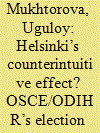

|
|
|
|
|
| Summary/Abstract |
Since the late 1990s, the post-communist states of Central Asia, as ‘participating States’ of the Organization for Security and Cooperation in Europe, have been regularly persuaded by the organization to invite its Office for Democratic Institutions and Human Rights to monitor their national parliamentary and presidential elections. The OSCE/ODIHR’s objectives have been to assist the Central Asian participating states in holding free and fair elections and aid in a presumed ongoing post-communist democratization process. We argue that contrary to OSCE’s assumptions, repeated OSCE/ODIHR election observations of Central Asian states with histories of fraudulent elections (as demonstrated by the case study of Tajikistan during 2000–2013) have not contributed to the flourishing of democracy and political pluralism, but rather inadvertently aided in the solidification of authoritarianism and ‘virtual democracy’ – a phenomenon we refer to as ‘Helsinki’s counterintuitive effect’. Using stakeholder interviews, we test four hypotheses in support of this general proposition.
|
|
|
|
|
|
|
|
|
|
|
|
|
|
|
|
| 2 |
ID:
153706
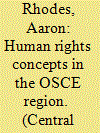

|
|
|
|
|
| Summary/Abstract |
The Helsinki Accords resonated with dissident movements in the Soviet Bloc that had reconstructed a classical liberal approach to human rights. Human rights campaigns on both sides of the Iron Curtain emphasized civil and political rights. But human rights revisionism, expanding the scope of human rights, was growing in international institutions. In 1993, the international community embraced the concept of the ‘indivisibility’ of human rights. An expansive, ‘post-modern’ vision of human rights de-emphasized the protection of basic individual freedoms, while expanding global regulation. A strong moral and political challenge to classical human rights has emerged in the form of Eurasianism, a statist doctrine that denies the existence of universal human rights and insists that each culture has its own values. The idea of human rights as protections for basic freedoms, diluted and weakened over decades by assaults and compromises, may lack the moral clarity needed to confront the Eurasian challenge.
|
|
|
|
|
|
|
|
|
|
|
|
|
|
|
|
| 3 |
ID:
163620
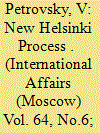

|
|
|
| 4 |
ID:
153705
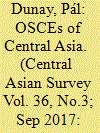

|
|
|
|
|
| Summary/Abstract |
Central Asia is the ‘best customer’ of the OSCE. It is the area of five post-Soviet OSCE participating states that are in significant need of support by the organization that prides itself on cooperative security and that have many shortcomings primarily in the humanitarian dimension, which the organization should foster to change. Central Asia has demonstrated less political and socio-economic transformation since its independence than it could have. While it receives reduced interest due to the declining importance of those two matters that contributed to it (rich natural resources and energy bearers and the vicinity of Afghanistan), the OSCE is the organization where Central Asia is ‘at home’. Central Asian states would like to face less soft persuasion (and even less hard pressure), but they would like to benefit from the assistance of the organization and its participating states. It is for this reason that there is more than one OSCE in Central Asia trying to meet the different needs of the area.
|
|
|
|
|
|
|
|
|
|
|
|
|
|
|
|
| 5 |
ID:
144975


|
|
|
|
|
| Summary/Abstract |
THE 25TH ANNIVERSARY of the incorporation of the German Democratic Republic into the Federal Republic of Germany fell at the year of the 70th anniversary of the victory over Nazi Germany in World War II, which saved the world from Nazism. This is an extra reason to try to see what conclusions the Germans drew from events that had become turning points not only in their own but in world history. One would be able to describe today's Germany with its determining influence on the policies of the European Union as a mini-great power, a country on which a lot depends worldwide. Periods when Germany was a great power properly speaking, both as the empire of the Kaisers and as the Third Reich, ended up in global disasters. Have the Germans learned those painful lessons of history? Before this question is answered, even approximate forecasting of the future of our continent is impossible.
|
|
|
|
|
|
|
|
|
|
|
|
|
|
|
|
| 6 |
ID:
129818


|
|
|
|
|
| Publication |
2014.
|
| Summary/Abstract |
On 5 June 2008, then Russian President Dmitry Medvedev proposed a new European security architecture. Medvedev suggested that the new security architecture could be considered a 'Helsinki Plus' treaty, an adaptation of the Helsinki Final Act to the current international state of affairs. This article examines how Russia was strategically reframing European security through its proposal for a new European security architecture, and in particular the sub-issues of how Russia was strategically framing security and European security and how this framing was an attempt to change existing formulations and perspectives on European security.
|
|
|
|
|
|
|
|
|
|
|
|
|
|
|
|
| 7 |
ID:
095406
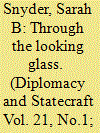

|
|
|
|
|
| Publication |
2010.
|
| Summary/Abstract |
The controversy surrounding the 1975 Helsinki Final Act made it an enduring issue in the 1976 campaign, and the political backlash against President Gerald R. Ford damaged his electoral chances. Ford's signature of the agreement, his continuation of deente, and his foreign policy more broadly may not have been decisive issues in his contests with Ronald Reagan and then Jimmy Carter, but they certainly were prominent throughout the election. Examining the influence of the Final Act on Ford's election campaign illuminates the extent to which a number of candidates sought to use popular opposition to the agreement to their advantage. Furthermore, it reveals how the 1976 presidential candidates, and Ford in particular, struggled to address growing questions about detente, human rights, and morality in foreign policy. Ford's failure to defend his signature of the Final Act adequately raised concerns about his foreign policy and personal leadership with the electorate.
|
|
|
|
|
|
|
|
|
|
|
|
|
|
|
|